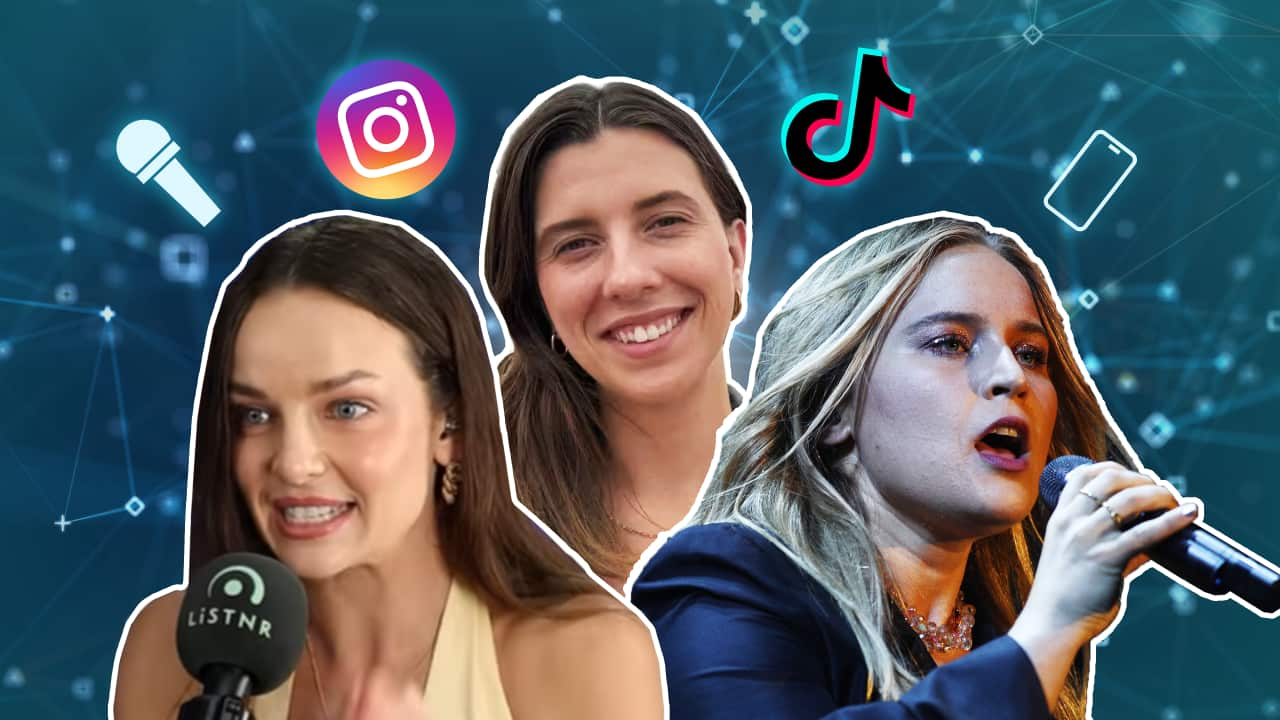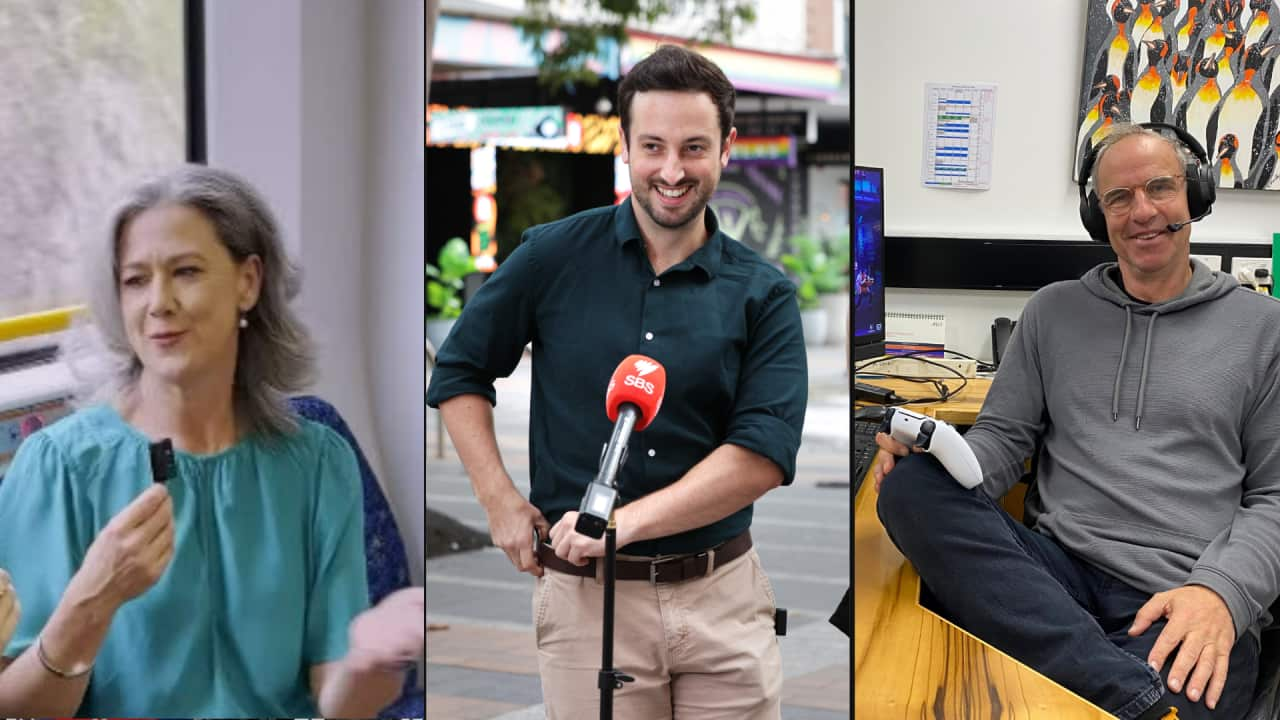Influencers were once confined to the squares on our social media pages and not considered serious players in the media industry, but as their power grows — so does their range.
Once associated with fashion, makeup and lighthearted lifestyle videos, Australians are also increasingly turning to them for their views on more serious issues.
It's a trend that politicians have also noticed. This year, for the first time, some influencers were flown to Canberra to cover the federal budget — an event that is typically the domain of political journalists and finance experts.
Coverage of the budget was transformed at the hands of content creators like mental health advocate Milly Rose Bannister, Cheek media co-founder Hannah Ferguson and podcast host Daphne Berry.
Rather than writing articles about the budget, they posted TikTok videos and Instagram reels, and shared information with their followers via Instagram stories.
In the lead up to , many are encouraging their followers to engage with politics and policy — and it's working.
Brisbane woman Emina is 29 years old and has never been interested in politics, but after following influencer and podcast host Abbie Chatfield, she was motivated to update her voting details and keep up to date with this year's election.
Chatfield first gained a public profile after appearing on TV show The Bachelor and is now a podcast host and media personality.

Abbie Chatfield was once a contestant on The Bachelor, but is now a podcast host and media personality. Source: AAP / Darren England
"I've followed Abby since she was on The Bachelor, and she's always been really opinionated and I love her for that," Emina said.
"I've always found her to be making it engaging and bringing to the surface the things that are often not spoken about enough."
Emina said she believes influencers speaking about politics can be empowering and educational for their followers.
While Chatfield has openly said she personally supports the Greens, Emina said she hasn't felt pressured to vote the same way.
"I haven't found Abbie to be forceful to tell me who to vote for, so that's also something that I've really respected … her message has been one of empowerment," she said.
It's a 'responsibility' to be part of the conversation
For Holly Rankin, who also performs as a singer-songwriter and recording artist under the name Jack River, pop culture and policy have always been linked.
Alongside her professional music career, Rankin has been involved in campaigns and activism for years. She is also the co-founder of Sentiment, a strategic communications and creative agency that aims to bridge the gap between politics and pop culture.
Rankin believes online content creators are often not taken seriously by older generations or traditional media and argues the term 'influencer' can be used to denigrate or dismiss their work and advocacy.
"At the end of the day, they're likely very good communicators who are passionate about something and they've grown an online community who have shared values with them," she said.

Singer Jack River, whose real name is Holly Rankin, supports musicians and content creators who speak about politics and policy. Source: Supplied
According to a 2024 report from the Australian Communications and Media Authority, 46 per cent of 18 to 24-year-olds nominated social media as their main source of news, and 31 per cent said celebrities and influencers were sources of their news content.
"The voting electorate is younger, and I think the world is in a really kind of frightening spot for a lot of younger people, so it's inspiring them to lean into politics," she said.
"Content creators are seeing not even an opportunity, more like a responsibility, to jump in and be part of the conversation."
With the election predicted to be close, Rankin said young voters could be the people who decide the results, particularly in marginal seats.
"So it's really important that they get good information and that they engage and also just learn about civics and politics," she said.
"If they're not getting it [from] politicians themselves, if they're not reading the news, how else are they going to get this information?"
Youth vote is transforming the election campaign
With millennials and gen Z voters now outnumbering baby boomers on the electoral roll, appealing to younger voters is becoming increasingly important to political parties.
According to the Australian Electoral Commission (AEC), there are 1,831,800 voters aged 18 to 24 enrolled for the 2025 election.
The youth enrolment rate, which tracks eligible voters in this age group, is sitting at 92 per cent.
Dr Susan Grantham, a lecturer in communication at Griffith University, believes social media has become "absolutely essential" in politics.
On platforms like Instagram and TikTok, Grantham said influencers have a "stronger hold over the audience" and may have more sway than posts made by candidates or political parties, which politicians are starting to realise.
"There's always been influencers out there that have been politically aligned and have promoted politics during election campaigns previously," she said.
But she said this election, political parties and leaders were now doing joint posts and podcasts with influencers.
"That's going to be highly influential and far more influential than what we would expect from a politician directly," Grantham said.

Dr Susan Grantham says social media has become an essential tool in political campaigns. Source: Supplied / Susan Grantham
"A lot of influencers — and I say 'influencer' but content creators and new media — have really powerful engagement with their audience who may not know that much about politics," she said.
"Our ability to communicate directly with our audiences about the issues that matter to them is far more engaged and far more relevant than large parts of legacy media."
'Demand' for influencers to have political opinions — and to talk about them
Ferguson also believes young audiences have an increased expectation that influencers or people with public profiles should be engaged in politics and social issues.
She said there is now a "newfound interest and demand" for content creators to make their values clear, with many viewers preferring to "invest time and trust into the people that they see as resonating with them".
"We expect the people that we look up to, the celebrities, the influencers, the people with public presences — to have political opinions and to talk about these things because we are very much a values-driven generation," she said.
"And we are the most powerful voting bloc in Australia in the lead up to the federal election."

Daphne Berry is the host of Airing Your Dirty Laundry. Source: SBS News
Berry, who hosts the music podcast Airing Your Dirty Laundry, told SBS News her platform is "about learning".
"I'm completely out of my depth in a lot of ways, but [I try] to come in and really learn and really listen to people who perhaps know a bit more than I do and ask questions," she said.
"[I then] explain it to people who ... don't fully understand what's going on in the country."
Criticism of influencers and AEC investigation
Not everyone is on board with new media and influencers becoming involved in politics
When content creators were invited to the federal Budget lockup in March, critics labelled the influencers as "self-obsessed" and questioned whether they were paid to attend.
Clips of Chatfield's interviews with Bandt and Albanese were reviewed by the AEC after Liberal senator Jane Hume questioned if they had breached electoral rules by not including an authorisation statement.
The posts were cleared of breaching any laws, with the AEC finding no evidence the podcaster had been paid for any political posts, or that Albanese or Bandt had any creative control in the interviews.
In a post on Instagram, Chatfield accused the Liberal Party of trying to discredit influencers speaking on politics.
"I'm all for the AEC making sure that everything goes by regulations [so] that we have safe and fair elections," she said.
"But the reality is there was no reason to question the integrity of my posts because I repeatedly stated publicly that I was not paid."
Chatfield said she believed the Liberal Party was trying to "minimise the impact of influencers and new media" and discourage content creators from speaking about politics.
According to Grantham, new media and influencers largely play a positive role in politics and education, but she acknowledged it is a "tricky space".
"We have to be careful that we don't let the traditional news media die; it still has a very solid place in politics," she said.
"What we do see is influencers taking on a similar role, and some of them are doing that very, very well, but they don't have to work to the same ethical codes or media law that go along with this sort of public commentary."
While many content creators produce educational content, they do not have the same obligations that journalists do in terms of fact-checking and impartiality. This can allow.
Grantham believes young people need to be taught how to question what they see and to think critically about social media and political commentary.
"But until we as a society are really good at doing that, there's obviously always going to be potential negatives," she said.
In a time of climate crisis, conflict, and global uncertainty, Rankin believes young voters and social media can ultimately play a part in creating a better future.
"I feel critically concerned [about the future], but I know we can write a new story.
"I feel optimistic, but there is a lot of work to do."
Visit the to access articles, podcasts and videos from SBS News, NITV and our teams covering more than 60 languages.




